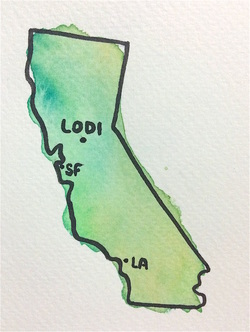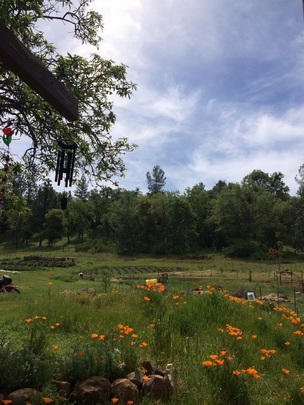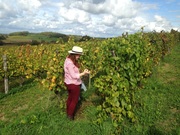|
I was at a wine trade tasting this week and heard the man next to me ask, "Biodynamic wine? So is it really true? They use a cow horn to make wine?"
This is an expected comment whenever people talk about biodynamics. I've heard "the horn comment" dozens of times. I just finished an internship at a biodynamic vineyard so I have hands-on horn experience. At the tasting, I chimed in to explain it the horn mystery, and now he doesn't think biodynamics is so crazy. #myworkhereisdone I'm going to explain why the horn isn't such a crazy idea. The Horn Sounds Like a Weird Idea
First, I'm going to confirm the rampant skepticism. It's a little strange to hear that a cow horn has a role in the vineyard. It sounds like voodoo. We are used to buying gardening supplies at big box stores, and using commercially-made fertilizers. Farming and gardening is a hard science that you learn about at the university. All you need is a big, red tractor and a machine harvester and you can get the job done, right? How on earth does a horn make sense, compared to these solid options?
0 Comments
 Where is Lodi, again? It's in northern California, just east of San Francisco. Image ©Floreana Edwards Where is Lodi, again? It's in northern California, just east of San Francisco. Image ©Floreana Edwards
Maybe I am late to the game, but native yeast fermentation is happening in Lodi.
Reluctantly perhaps, but it is happening. Lodi winemakers have recently started a new project called Lodi Native, which refers to fermentation using only native yeast. (Native yeast is naturally present on the skins of the grapes and will start the fermentation process without human intervention.) The alternative to native yeast fermentation is to inoculate the wine with a commercially-producted yeast strain. Commercial yeasts are very predictable, but tend to result in "cookie cutter" styled wines which taste very similar. As a comparision, think about the vast array of beer yeasts and how wildly different their styles taste. Wine works in just the same way. Lodi Native, therefore, is doing something pretty cool.  Abbondanza, a biodynamic farm and vineyard in Amador County, CA. Abbondanza, a biodynamic farm and vineyard in Amador County, CA.
I'm a sommelier who is currently living and working on a biodynamic farm and vineyard called Abbondanza. It is the creation of Daniel D'Agostini, and his farm is Demeter Certified Biodynamic. He is a third generation grape grower in the Amador County, CA.
Biodynamic wine can be more nuanced, surprising, flavorful, terrior-driven, and exciting than commercially made wines, in my humble opinion. Biodynamics does not permit chemical use in the vineyard or in the winery. I think this is the key to soulful winemaking. Because I am already a big fan of drinking biodynamic wine, I am having an incredibly educational experience working in the vineyard. The word biodynamic is a little mystifying and it's practices are misunderstood. Is it the same thing as organic? Is it regulated in any way? What does it do to the farm? I'm a novice, but I'll break down the basics. |
AuthorMy name is Floreana and I'm a sommelier. I think that natural wine is the shit. I also think that sustainable farming might just save the world. Categories
All
Archives |


 RSS Feed
RSS Feed
